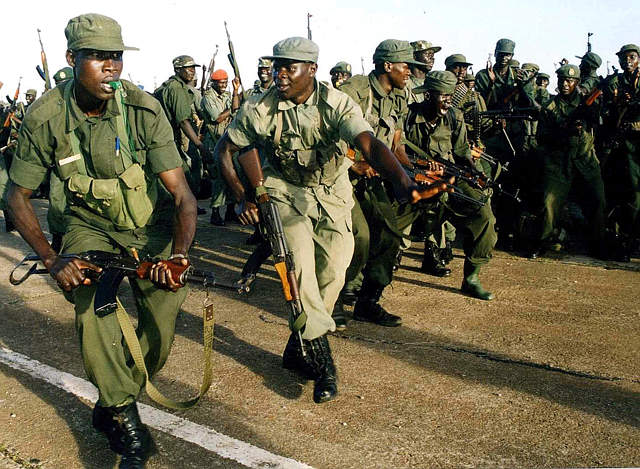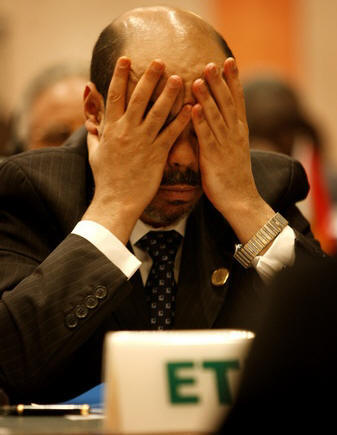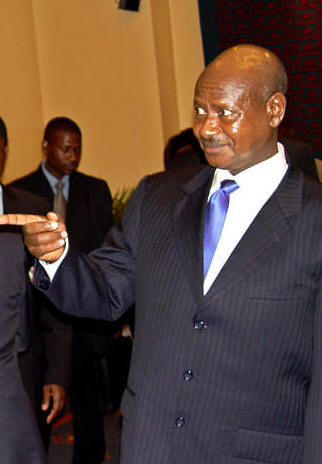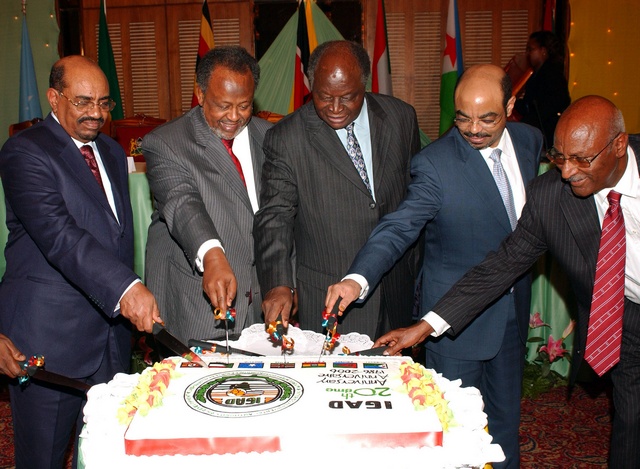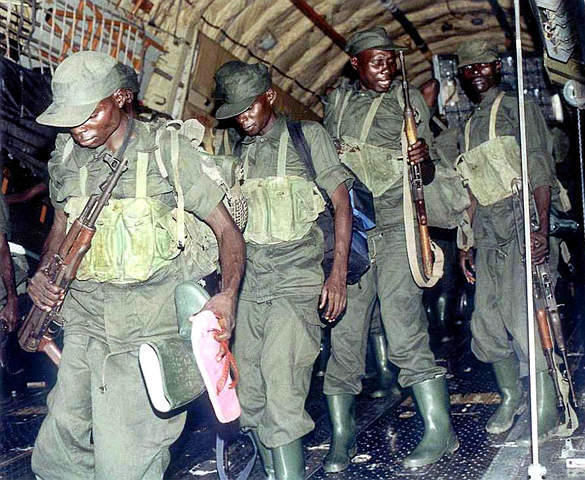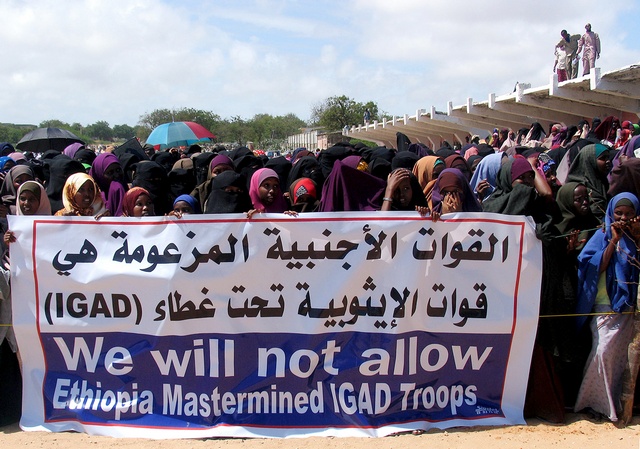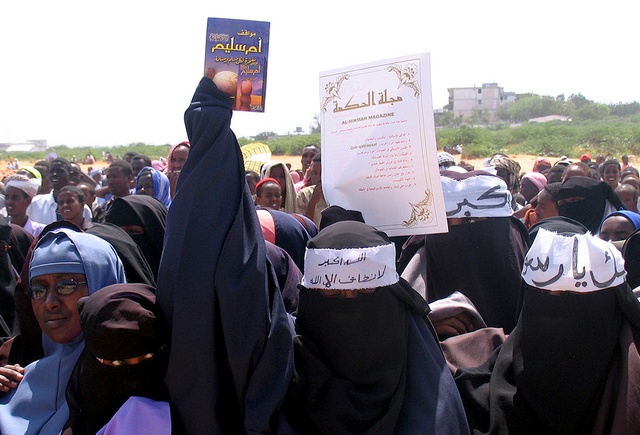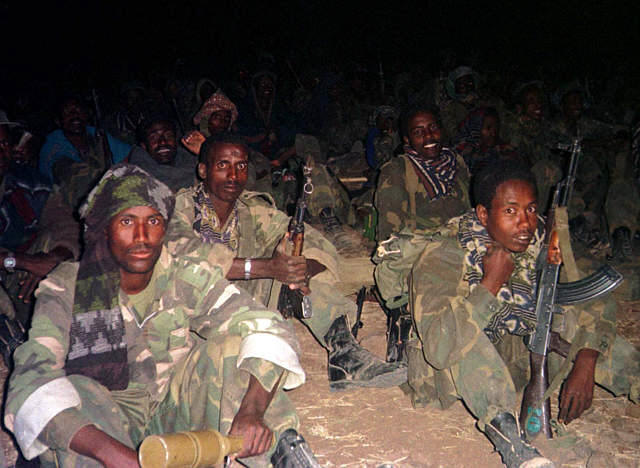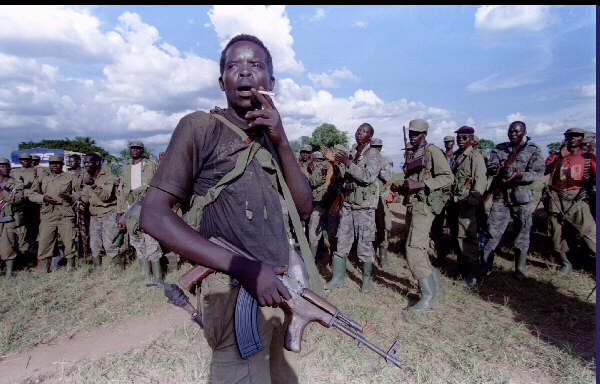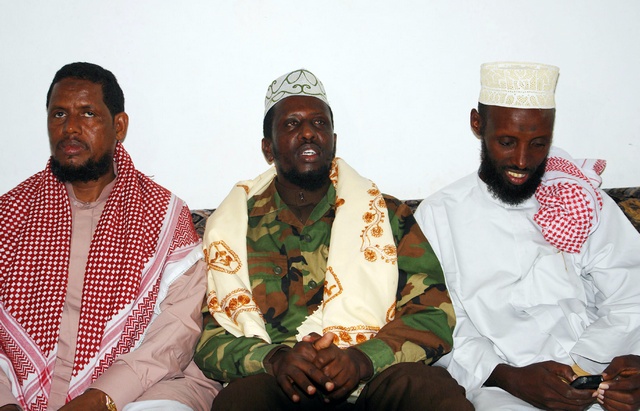|
The IGADSOM War |
|
S O M A L I A O N T H E B R I N K O F W A R
Kenyan President Mwai Kibaki (C), Eritrean Minister for Agriculture Arefaine Berhe (R), Ethiopia Prime Minister Meles Zenawi (2nd R), Djibouti President Ismail Omar Guelleh (2nd L) and Sudan's President Omar Hassan al-Bashir cut a cake to commemorate the 20th anniversary of the Intergovernmental Authority on Development (IGAD) in the Kenyan capital Nairobi March 20, 2006. East Africa must focus on solving the Ethiopia-Eritrea border dispute and also bolster the continent's credibility by shepherding Sudan's and Somalia's peace deals, regional leaders said on Monday. REUTERS/Presidential Press/Handout
Ugandan Troops
Somali protesters hold a poster during a demonstration in Mogadishu September 22, 2006. The poster is printed with slogans against the Inter-Governmental Authority on Development's (IGAD) proposed deployment of peacekeeping troops into Somalia. The IGAD is a peace mediation body made up of several east African nations. REUTERS/Shabele Media (SOMALIA)
Somali protesters shout slogans against the Inter-Governmental Authority on Development (IGAD) as they hold posters and Arabic books during a demonstration after Friday prayers at Tribuunka square in Somalia's capital Mogadishu September 22, 2006. The IGAD is a peace mediation body made up of several east African nations. REUTERS/Shabele Media (SOMALIA)
EDITORIAL & OPINION What’s going on in Somalia, and is the Horn of Africa on the brink of war?
BY ANNE PENKETH, DIPLOMATIC EDITOR December 08, 2006 The Independent
The big question
Why is this an issue now?
Because the UN security council unanimously adopted a resolution on Wednesday night providing for the dispatch of foreign peacekeepers to Somalia, which has triggered warnings that the move will spark all-out war and a regional conflagration. The peacekeepers were authorised to support the weak, unpopular transitional government which has international backing even though it only controls just one town in Somalia, Baidoa. The rest of the desperately poor Horn of Africa country, including the capital Mogadishu, is controlled by a loose coalition of Islamists known as the Union of Islamic Courts, whose fighters have swept across the country since June.
Is that a problem then?
The Americans and their Ethiopian allies think so because of their fear that al-Qa’ida is gaining a foothold in Somalia which had been in the grip of warlords since 1991, following the overthrow of the Somali dictator Mohamed Siad Barre. Washington says Somalia is a haven for those who carried out the US embassy bombings in Nairobi and Tanzania. The transitional government, which was formed two years ago under UN auspices, says it has proof that Islamic radicals from such places as Yemen and Chechnya have been pouring into the country to fight on the side of the Islamic courts.
But the Islamic courts – a purely Somali movement – do include many moderates and have bolstered their popularity by establishing law and order in the regions of southern Ethiopia which they now control. (The hardliners have shut down some cinemas and told radio stations not to play foreign music.)
The UN itself further poured fuel on the fire when a report by an expert panel claimed that 720 fighters from the Islamic courts had fought alongside Hizbollah during the Lebanon war last summer. The same report also accused Iran of attempting to buy uranium from the Islamists in return for weapons. The report named 11 countries that had violated an arms embargo in force since 1992 by sending weapons to one side or the other. However some of these claims seemed far-fetched to say the least. It was unusual for a UN report, whose conclusions are usually authoritative, to be queried by experts as this one was.
But the most dangerous development has been the intervention of outside forces.
Who’s involved in the conflict?
Mainly Ethiopia and Eritrea so fa, although US funding of warlords actually contributed to the current phase of the conflict. Ethiopia, a largely Christian country which is terrified of an Islamist state on its border, is reported to have deployed up to 8,000 troops in Somalia in defence of the transitional government. The Ethiopian government denies that troops are present and only admits to military advisers. However witnesses last month described the killing of six Ethiopian soldiers and wounding of 20 in a gun battle after Islamic fighters opened fire on a convoy of 80 trucks heading to Baidoa. Eritrea, which fought a bitter 30-year war of independence from Ethiopia, is believed to have a smaller number of troops supporting the Islamic courts.
How did the UN security council get involved?
The security council is supporting a peace process that is supposed to lead to a political settlement as a result of talks between the transitional government and the Islamists – which have so far gone precisely nowhere.
The US has been pressing for the UN partially to lift the arms embargo on the ground that the military expansion by the Islamic courts had created the need for a regional force to stabilise the situation inside the country. Resolution 1725 adopted on Wednesday authorised a regional force of 8,000 to protect the transitional government. It urged the Islamic courts to stop any further military expansion and carry on with the peace talks. It also specified that “those states that border Somalia would not deploy troops” to that country – thereby ensuring that neither Ethiopia nor Eritrea would be part of the peacekeeping force.
However it did not call on the foreign forces believed to be inside the country to pull out. The resolution threatened UN action against those who block peace efforts or attempt to overthrow the government, which could include targeted sanctions.
Britain, like the US a permanent member of the security council, voted in favour but did not join the US in co-sponsoring the resolution amid concerns that the Islamists would see the authorisation of peacekeepers as a provocation and intensify the conflict. Those concerns are shared by some members of the East African group Igad, which is sponsoring the Somalia peace process.
What has been the reaction to the UN decision?
Delight, as you might expect, in Baidoa where the transitional government is based. The Islamic courts were predictably furious. Ethiopia said that the peacekeeping force should have been authorised two years ago, when it was originally proposed, while Eritrea complained that the move was “an attack on the Somali people”. The US ambassador to the UN, John Bolton, dismissed accusations that the foreign peacekeepers – expected to come from Uganda and possibly Sudan – would inflame tensions further. He said that the UN was always being accused of not acting in time, and that this is an opportunity to have a regional force in place to prevent the situation from getting worse.
Is there a danger of a wider war?
Very much so, and possibly as soon as the rainy season ends later this month. A likely scenario that has given diplomats the jitters is that the Islamic courts fighters move on Baidoa, which Ethiopia would take as a signal to invade in support of the transitional government and to prevent the Islamists from desta-bilising parts of Ethiopia. And behind Ethiopia stands America – although in the light of the 1993 US debacle in Somalia it can be safely assumed that no American troops will ever head back to Mogadishu. The Horn of Africa has long been a cauldron of clan warfare and proxy wars, and nobody wants a return to the kind of conflict seen in 1977-78 between Somalia and Ethiopia over the Ethiopian Ogaden region. The last thing the Somali people need is more outside intervention.
It is hoped, however, that instead of deepening the conflict, the UN move will heighten the political pressure on both sides in Somalia to reach a political settlement, as it will take many months before any foreign peacekeepers can be deployed. But diplomats admit that there is a question mark hanging over the continued international recognition of the transitional government.
Should peacekeeping forces intervene in Somalia?
Yes...
The Somalis have known nothing but war, drought and famine for decades. The peace they deserve can only be imposed from outside
Somalia could be a hot-bed of international terror unless foreign troops intervene
African peacekeepers should be sent in as soon as possible to stop the conflict spreading and engulfing the region
No...
Foreign intervention has, if anything, made Somalia’s problems worse in the past rather than solving them
The transitional government is deeply unpopular and deserves to be ousted by its Islamist rivals without external involvement
It will take too long for peacekeepers to be deployed, so they will not be able to prevent the conflict from escalating.
East African cauldron of conflict
Full-scale war could be sparked by decision to send foreign peacekeepers into Somalia
ERITREA
Former enemy of Ethiopia, has deployed troops in Somalia in support of Islamists who have gained territory since fighting with US-backed warlords in June.
UGANDA
Seen as the most likely provider of troops to African peacekeeping force but it could take months to deploy – if it happens. Sudan also a possible contender.
KENYA
Concerned about instability in neighbouring Somalia, it wants an effective government to stop arms smuggling, and has hosted Somalia peace talks.
DJIBOUTI
Hosts Intergovernmental Authority on Development (Igad) which is sponsoring Somalia peace talks. Igad includes Djibouti, Eritrea, Ethiopia, Kenya, Somalia, Sudan and Uganda.
SOMALIA
Islamist militias, backed by Eritrea, control much of south. Weak transitional government, based in Baidoa, is internationally backed and supported by Ethiopia.
ETHIOPIA
Has deployed troops inside Somalia in support of internationally-backed transitional government, fearing Islamist state on its border.
© 2006 Independent & Media PLC
U.S. Knows Al-Qaeda Provides Training, Weaponry And Funding for UIC, Says Paper
December 07, 2006
Addis Ababa, Dec 07, 2006 (The Ethiopian Herald/All Africa Global Media via COMTEX) -- Al-Qaeda has emerged as a major player in the new Islamic regime in Somalia, World Tribune reported.
According to the newspaper, the United States has learned that Al-Qaeda provides training, weaponry and funding for the ruling Islamic movement in Somalia. In 2006, Islamic fighters, known as the Union of Islamic Courts, took over Mogadishu and much of the country.
US Assistant Secretary of State Jendayi Frazer said "They [Al-Qaeda] are providing great comfort." In her November 29 briefing, she said Al-Qaeda has enabled the rapid increase of UIC forces.
The Islamic group has been accused of sponsoring car bombings near the headquarters of the transitional federal government recognized by the United States and United Nations, the paper pointed out.
The State Department said on November 28 that continued military expansion by the UIC has prevented the dialogue between the UIC and the Transitional Federal Government from moving forward and has created the need for deployment of a regional force.
The department further stressed that the force will deter further aggression against the transitional government, create the required space for dialogue and stabilize the situation.
Frazer said the United States has sought to capture three Al-Qaeda operatives in connection with the 1998 bombings of U.S. embassies in Kenya and Tanzania. The three, also blamed for the bombing of an Israeli-owned hotel in Kenya in 2002, have come from Sudan, Kenya and the Comoros Islands.
"We're continuing to work with all sides in Somalia to try to get those terrorists turned over and to prevent Somalia from becoming a safe haven," Frazer stressed.
© 2006 AllAfrica, All Rights Reserved
Ethiopian president calls on public to defend nation against Islamists
December 08, 2006
Addis Ababa, 7 December: President Girma Woldegiorgis said nations, nationalities and peoples of Ethiopia should stand in unison in reversing the threat posed by the Union of Islamic Courts in Somalia, the Eritrean government, and other anti-peace forces to disrupt the peace and sovereignty of Ethiopia and to disregard the right of self-determination in the country.
The president said nations, nationalities and peoples of Ethiopia should strengthen the on-going development activities and the democratization in the country while maintaining the peace and security of the nation.
President Girma made the statement on Thursday [7 December] at a symposium organized in connection with the Nation's, Nationalities and Peoples Day of Ethiopia due to be celebrated on December 8, 2006.
The president said about 80 nations, nationalities, and peoples that have different culture and language have been living together in Ethiopia for years with mutual respect, tolerance, and tranquility.
The president said the federal constitution endorsed in 1994 [Ethiopian calendar, 2001] ensured the individual as well as collective rights of nations, nationalities and peoples of the country.
Deputy Speaker of the House of Federation, Dr Mohammed Serehaye on his part said the day is historic since all peoples of Ethiopia would reaffirm their commitment to speed up development and build democracy across the nation.
Dr Mohammed said the festival would also be a day for the peoples of the nation to renew their determination and stand together in safeguarding the federal system of governance in the country.
President of the Addis Ababa University, Prof Andreas Eshete and Special Advisor of the Prime Minister with the rank of a minister, Dr Fasil Nahom presented research papers at the symposium.
Source: ENA website, Addis Ababa, in English 8 Dec 06 © 2006 The British Broadcasting Corporation. All Rights Reserved.
Do not enter Somalia, Islamist leader warns foreign troops
December 08, 2006
Text of report by Aweys Osman Yusuf entitled "Islamist - We do not want your war. Do not enter Somalia" published by Somali independent Shabeelle Media Network website on 7 December
In a press conference held in the capital Mogadishu, the first acting chair of Union of Islamic Courts executive council, Shaykh Abdirahman Janaqow, said the UN Security Council resolution on Somalia was an aggression against the Somali population.
He said there was never an arms embargo on Somalia. "Ethiopia has been transporting arms and troops to Somalia and it has thousands of troops in the country, no-one criticized it. Instead Ethiopian troops in Somalia were permitted lingering while additional African troops will be deployed", he said.
Ethiopia, which is America's main ally in the war on terror in Horn of Africa, was blamed by Islamists that it has prepared draft resolution and took it to US government to convince UN Security Council member states to lift the arms embargo on Somalia and allow African peacekeepers go in the country.
Islamic Courts chairman Shaykh Sharif Shaykh Ahmad said the United States wants to revenge on the Somali people in the war in which they had lost 18 soldiers in 1993 when its troops were in Somalia for relief operations. "Our troops are geared up to fight with any foreign soldier that comes to Somalia," Ahmad said.
He said Somalia needs international help to resume peaceful dialogue. "We tell you (African troop contributing states) that we do not need your war and your unfairness. Do not enter Somalia or you will be defeated," he said.
Shaykh Sharif said the UN did not make resolution of letting African troops in Somalia but that it was America's decision.
Somalia's Union Islamic Courts seized central and southernmost of the country, including the capital Mogadishu after it evicted warlords from the capital forcefully early June this year.
The head of the Islamic Courts security department, Shaykh Yusuf Muhammad Siyad Indha Ade, reiterated that Muslims around the world should avert foreign troops' entry to Somalia.
Earlier, Islamic courts leaders called on Muslims around the world to come to Somalia's defence against Ethiopian troops in the country.
Somalia lost its central government in 1991 when tribal warlords overthrew former president Siad Barre.
© 2006 The British Broadcasting Corporation. All Rights Reserved.
Ethiopian soldiers rest on the way to the war front outside the town of Adigrat February 17. Ethiopia has the backing of the international community in its demand that Eritrean troops withdraw from contested border territories, and says it has no need to gloat over its victories by presenting bloodied Eritrean bodies to the media.
An officer in the Ugandan Army chats to his men March
Somali Islamist leader Sheikh Sharif Ahmed (C), flanked by Sheikh Yusuf Indho-adde (L) and Sheikh Abdulkadir Ali Omar (R), address a news conference at Villa Somalia, former presidential palace in the capital Mogadishu, October 9, 2006. Somalia's powerful Islamists on Monday declared holy war against Horn of Africa rival Ethiopia, which they accused of invading Somalia to help the government briefly seize a town controlled by pro-Islamist fighters. REUTERS/Shabele Media (SOMALIA)
|
